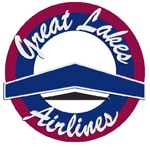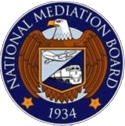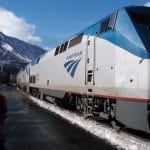In a report by Colorado Public Radio, the Essential Air Service (EAS) program is on the chopping block in Trump’s budget. EAS helps fund small airlines, like Great Lakes Airline, to provide service to smaller airports throughout the country. Without this funding, these small airlines could fold.
In Colorado alone, Pueblo, Alamosa and Cortez airports are operated by airlines who receive EAS funds. If these funds go away, small airlines may not be able to afford to provide service to and from these small cities. Great Lakes Airlines currently receives EAS funding for flights in and out of Denver, Pueblo and Telluride, Colo.
Read more from Colorado Public Radio.
Tag: Essential Air Service

Great Lakes Airlines is the largest recipient of Essential Air Service grants, which helps keep flights operating to 120 communities in 35 states. Such assistance is seen as crucial to the economies of rural communities.
Congress has changed a provision of the program to require that Essential Air Service routes average at least 10 passengers daily and that no new communities be added to the program.

Great Lakes Airlines pilots are members of United Transportation Union (UTU) Local 40 in Denver.
Great Lakes Airlines is based in Cheyenne, Wyo., and serves 48 of its destinations with assistance from federal subsidies provided by the congressionally created Essential Air Service program. The airline is the nation’s largest provider of Essential Air Service and those federal subsidies assure air service to communities in rural areas that are without easy access to the nation’s transportation network.
In seeking the release from mediation and a proffer of binding arbitration, UTU International President Mike Futhey told the NMB that despite the 53 mediated bargaining sessions in which the UTU has sought to bargain in good faith, “the airline has refused even to discuss an acceptable offer, thus creating an impasse.”
Airlines, as railroads, are governed by the Railway Labor Act (RLA), which puts the National Mediation Board (NMB) in control of negotiations until such time as the NMB determines there is an impasse and releases the parties from mediation. If either side rejects a proffer of binding arbitration, the Railway Labor Act provides for a series of cooling-off periods, during which the White House may appoint a Presidential Emergency Board (PEB) to make non-binding recommendations for a settlement.
If the sides cannot reach a voluntary settlement based on those recommendations, or if a PEB is not appointed – and PEBs are rare in stalled airline negotiations — then either side becomes free to engage in self-help, which could include a work stoppage by pilots.
UTU International Vice President John Previsich, who is assigned to assist in the negotiations, said, “Self-help from either party is not UTU’s desired outcome for this process as it would have a significant negative impact on the Essential Air Service provided by Great Lakes Airlines. The UTU’s desire is that the parties reach a mutually satisfactory agreement and avoid any interruption to the Essential Air Service.”
From the onset of negotiations with Great Lakes Airlines in October 2009, the UTU has presented evidence that the current contract – which the UTU seeks to amend under provisions of the RLA – is substandard in terms of working conditions and wages that daily puts pressure on Great Lakes pilots whose highest priority is to fly passengers safely.
Under the current contract with Great Lakes Airlines, pilots are among the lowest paid of any scheduled passenger airline in the United States.
On Great Lakes Airlines, a first officer can expect to make less than $15,000 in the first year.
The carrier’s latest offer provides that first officers will continue to make less than the flight attendants with whom they are working. In addition, the airline proposed a reduction of 15 percent in the monthly guarantee for all pilots.
These pilots are professionals with extensive training and expertise, and some of them are paid less than entry-level retail and food service jobs.
Difficult negotiations with Great Lakes Airlines are not rare. Great Lakes Airlines flight attendants, now represented by the UTU and also members of UTU Local 40, were in negotiations with the airline for 10 years (initiated prior to the selection of UTU as their bargaining representative in 2009) before a new agreement was reached and ratified.
The UTU-negotiated contract for flight attendants is the only ratified agreement the carrier has received with any labor organization since the first contracts were negotiated in the 1990s.
The pilots fly 30-passenger Embraer and 19-passenger Beechcraft aircraft, serving airports in Arizona, California, Colorado, Iowa, Kansas, Nebraska, Nevada, New Mexico, North Dakota, Michigan, Minnesota, South Dakota, Utah and Wyoming, and with crew bases in Arizona, Colorado, New Mexico, North Dakota, Minnesota, South Dakota and Wyoming.
The local hosts its own website, www.faircontractnow.com

Colorado State Legislative Director
Safety is job number one for UTU-represented pilots employed by Great Lakes Airlines.
Yet their current contract with the carrier is substandard in terms of working conditions and wages that daily puts pressure on their ability to fly passengers safely.
The image of airline pilots earning high wages and access to company-paid top-flight hotel rooms does not apply to our Great Lakes brothers and sisters.
Under the current contract with Great Lakes Airlines, pilots are the lowest paid of any scheduled passenger airline in the United States.
On Great Lakes Airlines, a first officer can expect to make less than $15,000 in the first year. These pilots are professionals with extensive training and expertise, and some of them are paid less than entry-level retail and food service jobs.
Imagine a pilot on food stamps, or having to sleep in passenger lounges in airports. Don’t imagine. Just ask a Great Lakes pilot.
Their UTU Local 40 has been in negotiations with Great Lakes management for more than two years, with negotiations locked-down in difficult mediation under provisions of the Railway Labor Act, which also applies to airline workers.
Local 40 flight attendants, also represented by the UTU, recently ratified a new agreement, but negotiations dragged for – yes – 10 years! The pilots are hoping to reach an equitable settlement with Great Lakes Airlines more quickly.
In a recent poll of pilots, 97 percent supported a job action, but that is not possible until the National Mediation Board releases the parties from mediation.
Based in Cheyenne, Wyo., and with hubs in Albuquerque, N.M.; Denver; Los Angeles, Minneapolis and Phoenix, Great Lakes Airlines serves 48 of its destinations through federal subsidies provided by the congressionally created Essential Air Service program. The airline is the nation’s largest provider of Essential Air Service.
The pilots fly 30-passenger Embraer and 19-passenger Beechcraft aircraft.
UTU members can help their brothers and sisters at Great Lakes Airlines by contacting city council members in the cities Great Lakes serves, and by contacting members of Congress.
The message is straight forward: For the safety of the flying public, pilots on Great Lakes Airlines deserve a contract that provides for a livable wage and appropriate accommodations at layover points to ensure they receive undisturbed rest.
To contact your congressional lawmaker on behalf of our brothers and sisters at Great Lakes Airlines, click on the following link:
www.contactingthecongress.org/
Then select your state, click on the names of your senators and representative, and you have the information needed to send an email or fax, or make a phone call.

Lawmakers voted to scrap an attempt by House Republicans to overturn a 2011 National Mediation Board (NMB) ruling making organizing under the Railway Labor Act comport with rules of all other elections in the U.S.
President Obama says he will sign the bill into law.
The NMB last year revised its rule on representation elections, providing that in all representation elections under the Railway Labor Act (which also covers airline employees), only ballots from those actually voting would be counted. Previously, those not voting were considered to have voted “no” for representation. In changing its outdated 75-year-old representation election rule, the NMB said no other elections in the United States count those not voting as having voted ‘no.’
The legislation does change NMB representation rules by requiring 50 percent of eligible employees sign an authorization card (rather than 35 percent) before a representation election may be held. The UTU has long required more than 50 percent before seeking a representation election on railroad and airline properties it seeks to organize.
The legislation also requires public hearings for future NMB rulemakings, and requires Government Accountability Office audits of the NMB every two years.
While continuing the Essential Air Service subsidy program for rural airports, the legislation does cut service to some rural airports, but not those served by Great Lakes Airlines, whose crews are represented by the UTU.
The legislation provides some $13 billion for airport improvements and $38 billion for Federal Aviation Administration air traffic control operations.

The funding is for fiscal year 2012, which began Oct. 1. Earlier, Congress agreed to legislation extending FY 2011 funding until final agreement on FY 2012 funding could be reached.
AMTRAK
For FY 2012, Amtrak will receive $1.42 billion, or $64 million less than Amtrak received in FY 2011. The 1.42 billion includes $466 million for operations — 17 percent below operating assistance provided Amtrak for the previous fiscal year. The remainder, or $952 million, is for capital improvements and debt service — 3 percent above what was provided for capital improvements and debt service in FY 2011.
In a victory for Amtrak, Congress agreed to scrap an earlier House effort to eliminate the use of federal dollars for 26 state-supported Amtrak routes, which help fund some 150 regional passenger trains serving nine million passengers annually.
However, Congress chose to zero-out new funding for higher-speed rail. President Obama had proposed $3.6 billion for higher-speed rail for FY 2012 (and $53 billion over six years), and the Senate had proposed $100 million for FY 2012. Rep. Jerry Nadler (D-N.Y.), a member of the House Rail Subcommittee, said of the funding cut:
“I truly believe that it is the best we are going to do in this current economic climate. High-speed rail should be an option between any cities within a 500-mile radius, providing competitive trip times and fares, freeing up airspace and benefitting our environment, economy and national security. It makes no sense to abandon our efforts to develop high-speed rail in this country, so I hope the Republicans abandon their efforts to kill it.”
Congress also agreed to limit overtime payments by Amtrak to no more than $35,000 per employee, although there is an exemption if Amtrak finds that the cap for any specific employee would pose a risk to safety or operational efficiency.
BUS and TRANSIT
Congress voted $2.1 billion for the Federal Transit Administration, which includes an $18 million increase in funding for state and local bus grants to $8.3 billion for FY 2012. Also provided is $1.9 billion in grants for new bus and transit start-ups – an increase of $358 million from FY 2011. However, the legislation limits the federal share of new starts to 60 percent, which could pose problems for budget-challenged municipal transit agencies.
Congress has yet to agree on allowing a portion of federal dollars earmarked for new equipment and facilities to be used by municipalities and states for operations so as to retard elimination of bus routes and employee furloughs. The UTU National Legislative Office continues to educate congressional lawmakers on the importance of allowing such flexibility.
AVIATION
Congress funded the Essential Air Service program at $144 million for FY 2012, but included language limiting funds to communities that first received Essential Air Service grants in FY 2010 and FY 2011. Congress remains deadlocked on longer term authorization for the Essential Air Service program.
Additionally, the Federal Aviation Administration received $12.5 billion – an increase of $137 million from FY 2011 – for airports, facilities and equipment, as well as for the Next Generation Air Traffic Control System.

Two sticking points this year in reauthorization of the Federal Aviation Administration (FAA) are an extension of the $200 million Essential Air Service program and a National Mediation Board ruling affecting representation votes under the Railway Labor Act.
The Essential Air Service program — which subsidizes commercial air service to some 150 rural communities that, otherwise, would lose their air service because it is unprofitable — is provided primarily by regional airlines that employ UTU-represented pilots and flight attendants.
The NMB rule-change scrapped a 75-year curiousity of counting those who chose not to vote as having voted “no” for union representation. The new rule comported with every other democratic election — whether it be for the local PTA or for members of Congres — counting only those ballots actually cast in determining whether employees wish to be represented by a labor union.
However, conservative Republican leaders, such as House Transportation & Infrastructure Committee Chairman John Mica (R-Fla.), want to scrap subsidies that assure air service to rural areas and overturn, through legislation, the NMB ruling.
While the Republican-controlled House of Representatives remains opposed to the Essential Air Service subsidies and the modernization of the rep-vote rule by the NMB, the Democratic-controlled Senate has pushed back. With no agreement, lawmakers have passed a series of short-term funding extensions that keep the nation’s commercial aviation network running while they continue to lock horns over the subsidy and vote-rule issue. As a result, long-term funding for airport and safety improvements is in liimbo.
The latest of 22 short-term extensions expires Jan. 31, and Mica is threatening to allow another partial shutdown of the system as occurred earlier this year when the House and Senate failed to agree, for a few days, on even another short-term extension.
Senate Majority Leader Harry Reid (D-Nev.) and Senate Commerce Committee Chairman Jay Rockefeller (D-W.Va.) remain committeed to not sacrificing the Essential Air Service program or allowing a congressional rollback of the NMB rule. President Obama has promised to veto any bill that does not preserve the Essential Air program and leave untouched the NMB ruling.
This congressional battle, as with so many other issues before Congress, has become, from Greek mythology, a Sisyphean struggle – a reference to King Sisyphus punished by being compelled to roll an immense boulder up a hill, only to watch it roll back down, and having to repeat this through eternity.